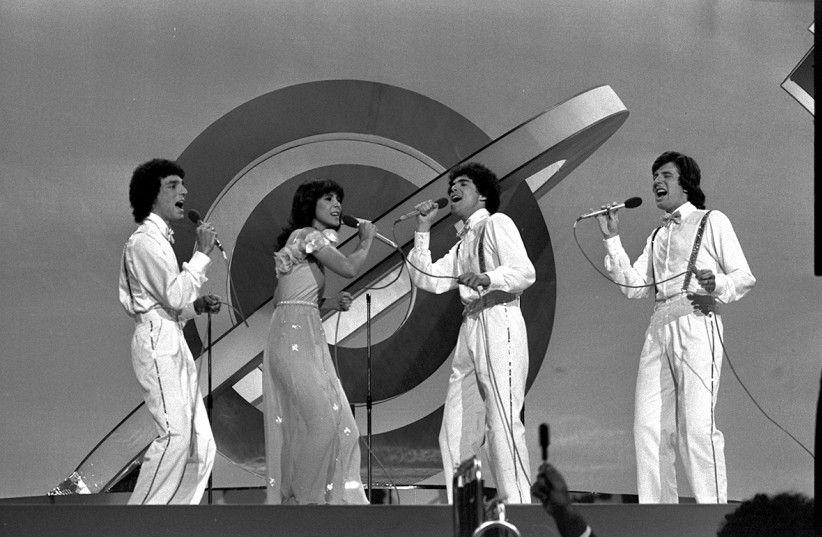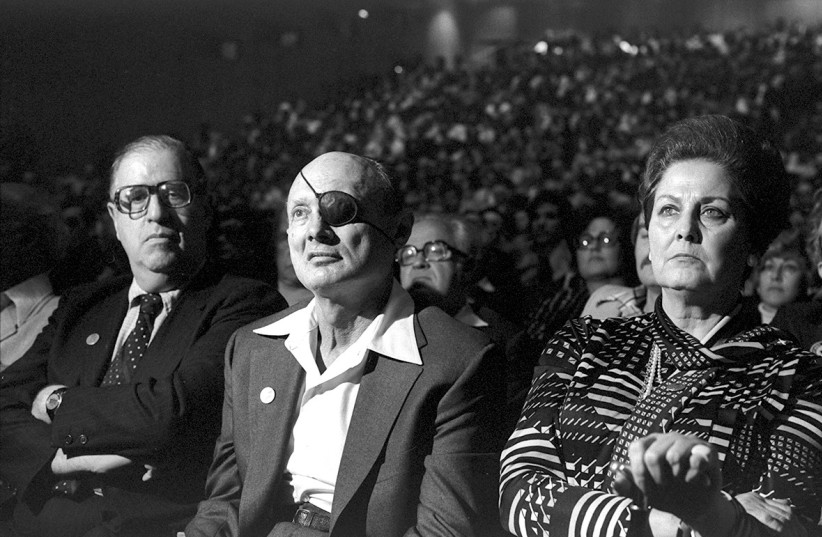
Prime Minister Benjamin Netanyahu spoke to AIPAC last week from the new TV studio at the International Convention Center (ICC) Jerusalem, known to us locals as Binyanei Ha’Uma.
An Israeli wine festival. An international dance festival. Eurovision. These are just a few significant events held at the ICC, which is coming up on its 75th anniversary.
Established in 1950 by the Jewish Agency, the Jewish National Fund, and the Jerusalem Economic Development Company, ICC was meant to be a “conference center that would symbolize the sovereignty of the young State of Israel and become a gathering point for the Jewish people,” according to its website. It was the official seat of the World Zionist Congress; the first congress to be held in Israel took place at the ICC before the roof was even completed.
Today, the center is managed by Interim CEO Alex Alter, a 35-year ICC veteran originally hailing from Argentina. Alongside him is Rakefet Eliaz Iluz, the vice president of marketing and business development, who has been working here for 18 years and is now shaping ICC for the artificial intelligence era. Together they’re creating a space that accommodates large gatherings and fosters connections from anywhere in the world.
Last week, at the ICC’s conference room table beneath its 27 halls, we sat down with Alter and Iluz, who unveiled their vision for transforming this historic structure – a cherished cornerstone of Jerusalem life, poised for further growth and impact.

“In the last few years, we’ve changed our strategy from being a convention center that only hosts events to one that presents them,” Iluz explains. “Corona taught us that we have to adapt ourselves, not the other way around.”
In the last few years, ICC has built a professional studio, outfitted all of its halls to host virtual events, and started providing remote access tours. Moreover, Alter stresses that it has created a “Ha’Uma” brand and begun bringing in content for the locals – meaning the citizens of Israel, not necessarily just Jerusalem residents, though locals can receive discounts (through the Yerushalmi card).
ON THE NIGHT we are visiting with Alter and Iluz, the building has two significant events. In one hall, Leil Ha’Uma (Night of the Nation) is unfolding. It starts with a Jerusalem shuk dinner – falafel and dips, pizza and wine from local vendors. Then Koolulam performs its special brand of interactive concert, with songs of unity fitting for five-plus months of war. The Jumbotron-like camera pans across the audience of hundreds of men and women of all ages singing their hearts out and swaying, eyes shining.
At the same time, the ICC is hosting hundreds of ZAKA search-and-rescue workers for an evening of thanks. The hall and catering are designed for a bride and groom, the ICC is footing the bill, and Alter presents the Yakir Ha’Uma award (for those cherished and notable to the nation) to the organization’s leadership.
While ZAKA does the work most of us can’t bear to think about – gathering body parts such as fingers for Jewish burial after victims’ unnatural death by terror attack, disaster, or accident – the mood is celebratory.
These volunteers have been deployed since Oct. 7, but tonight is a chance to relax, enjoy raucous live music on the elaborate stage, and bask in a little lightness with their colleagues, and the praise and appreciation of figures such as Mayor Moshe Lion, National Security Minister Itamar Ben-Gvir (no politics here!), Ashkenazi Chief Rabbi David Lau, and Migdal HaEmek Chief Rabbi Yitzchak Dovid Grossman. A father and son from the audience – the elder a volunteer, bringing his son in recognition of all the hours he has spent away from home – sing a duet with fervor.
We emotionally express our gratitude to a ZAKA volunteer with long payot, comfortably seated at a table with more secular volunteers. How does he do it? “The things I’ve seen,” he says. “I get extra strength from the One Above,” he says, pointing upward.
ALTER IS soft-spoken, with smile creases near his eyes, while Iluz is more dynamic, talking with her hands and eager to share videos and pictures of the ICC. He lives in Ein Kerem, she lives outside Jerusalem. What they have in common is their love of the center and the people who come there.
“Every event we host is like a wedding to our clients [in its importance],” Iluz says. “I love to get excited and help make other people excited. I like to think outside the box and be creative. I work in the right place!”
The cornerstone to the future vision of Jerusalem
ICC Jerusalem is set to become the cornerstone of Mayor Lion’s vision for the new entrance to Jerusalem. This vibrant area will blend modern amenities, including a hi-tech park, enticing restaurants, upscale senior living facilities, diverse shopping options, and hotels. Central to this transformation is the ICC, which can accommodate up to 10,000 attendees. Its Ussishkin Hall has capacity for 3,000 guests.
The bustling events hosted at the ICC – conventions, conferences, concerts – draw tourists to Jerusalem, who typically spend around 40% more than regular visitors, Alter says. While it operates as a business, meaning it charges for its services, the ripple effect is felt citywide, with Jerusalem reaping significant financial benefits from the increased tourism and economic activity generated by ICC events.

Alter says he plans to remodel the center in the next three years, though he laughs about how long it might take to complete the project in a city like Jerusalem. Building the Red Line of the light rail took eight years.
However, Alter says the ICC will not close during construction – just as it has not stopped since Oct. 7 and amid the ongoing war.
“We decided to support our soldiers and our community,” he says, telling us about benefit events the ICC has held on behalf of Israel’s security services. And the center kept events going during COVID and the war – even when audiences couldn’t enter, going fully virtual.
“We continued to be a home for our clients to do their events with almost no strings attached,” Iluz notes. “There were periods, like at the beginning of the war, when people just wanted to hear themselves on stage. So we let them, with all the lights and amenities of a typical concert.”
On the ICC’s walls are pieces of art from local emerging artists.
“We have 400,000 people come here every year, so it is a way to see their art,” Alter says.
It is exceptional to live and work in Jerusalem, he says, the holy city of the world’s three major monotheistic religions.
“The air here is different,” Iluz says.
Alter agrees: “There is nothing like Jerusalem.”■
